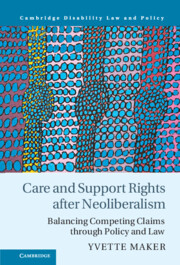Book contents
- Care and Support Rights after Neoliberalism
- Cambridge Disability Law and Policy Series
- Care and Support Rights after Neoliberalism
- Copyright page
- Contents
- Table
- Foreword
- Acknowledgments
- Abbreviations
- Introduction
- Part I Care Policy Tensions
- 1 A Feminist Dilemma
- 2 The Universal Caregiver Model
- 3 Disability Rights and Carers’ Advocacy
- 4 A Disability Rights–Informed Ethics of Care
- Part II Balancing Competing Claims through Rights-Based Policy and Law
- Part III Care and Support Policy Tensions in Two Liberal Welfare States
- Index
- Other Books in the Series
1 - A Feminist Dilemma
Support Unpaid Care or Support Paid Work?
from Part I - Care Policy Tensions
Published online by Cambridge University Press: 21 April 2022
- Care and Support Rights after Neoliberalism
- Cambridge Disability Law and Policy Series
- Care and Support Rights after Neoliberalism
- Copyright page
- Contents
- Table
- Foreword
- Acknowledgments
- Abbreviations
- Introduction
- Part I Care Policy Tensions
- 1 A Feminist Dilemma
- 2 The Universal Caregiver Model
- 3 Disability Rights and Carers’ Advocacy
- 4 A Disability Rights–Informed Ethics of Care
- Part II Balancing Competing Claims through Rights-Based Policy and Law
- Part III Care and Support Policy Tensions in Two Liberal Welfare States
- Index
- Other Books in the Series
Summary
This chapter discusses ‘Wollstonecraft’s dilemma’ – the quandary facing feminists concerned with social provisioning in terms of whether to pursue women’s equality through support for their unpaid caregiving roles or through support for their paid work participation. Each option is based on (and assesses women against) the male norm of citizenship and social participation, with policy either supporting women’s ‘difference’ from men in unpaid caring or treating women ‘like’ men in paid work. Care-supportive and work-supportive policies in liberal welfare states have had both advantages and disadvantages for women. Policies that support women’s unpaid care for children or adults offer some recognition and remuneration of such roles but limit women’s ability to participate in the public sphere. Policies that support or require women to engage in paid work may offer economic autonomy but do not generally recognize or address women’s disproportionate responsibility for care. This chapter also discusses the neoliberal trend away from support for care and maternalism toward ‘employment for all’ regardless of care and support responsibilities.
Keywords
- Type
- Chapter
- Information
- Care and Support Rights After NeoliberalismBalancing Competing Claims Through Policy and Law, pp. 23 - 43Publisher: Cambridge University PressPrint publication year: 2022

